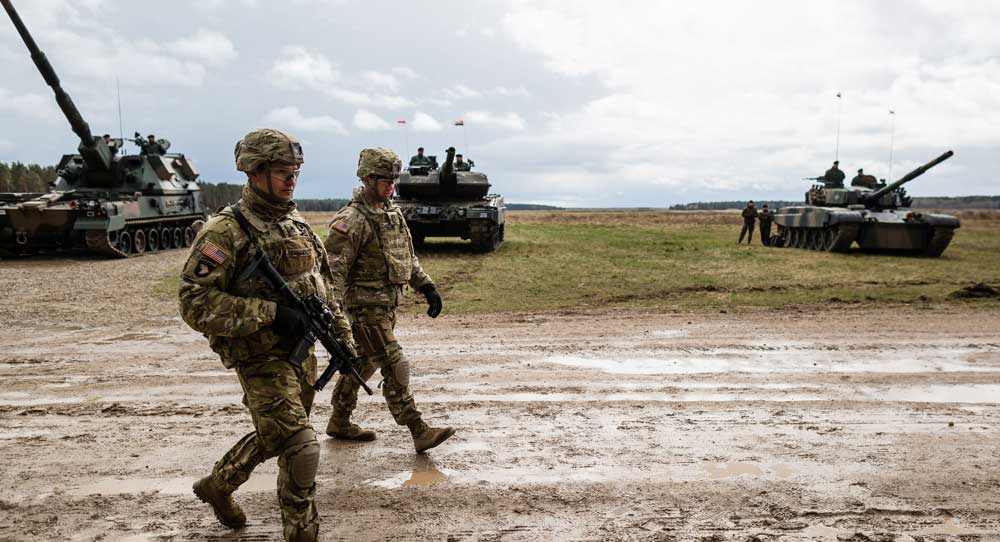Ahead of the NATO summit in July in Brussels, Poland is pulling out all the stops. It wants the United States to deploy American troops in Poland on a permanent basis. And Warsaw is willing to pay $2 billion to establish joint military installations and provide more flexible movement of U.S. forces, according to the defense ministry.
Poland is only seeking what the Baltic States and Central European countries have been requesting ever since they joined NATO in two waves—in 1999 and in 2004. They want the alliance to fill the security vacuum in this part of Europe.For them, that means putting boots on the ground and on a permanent basis, compared to the system of rotation that NATO agreed to four years ago at its summit in Cardiff, Wales. And for them, it is the presence of American troops that will provide the dual role of deterrence and defense against any Russian threat.
But politically, the request is about something more fundamental. It’s the knowledge that Europe is not up to the task of providing the security and defense necessary to protect the continent.
“Can Europe defend itself?” asked Ivan Krastev, director of the Center for Liberal Strategies in Sofia, who opened this year’s Körber History Forum in Berlin on May 28. “Is Europe failing the post-war project? It takes the peace for granted,” he told the audience.
Krastev’s remarks had a particular resonance for Germans. Ever since the reunification of Germany and Europe, the German armed forces has become so depleted and so devoid of leadership and strategy that it cannot even fulfill its obligations to NATO’s rotational deployments in Poland and the Baltic States.
Poland’s request is a long-standing one. Former foreign minister Radek Sikorski (who also did a stint as a defense minister) made it one of his top priorities. But during the early stages of the Obama administration, when there was a U.S. pivot away from Europe to Asia, Sikorski saw the need for the EU to establish a credible defense and security policy.
Well, that hasn’t gotten very far—and not just because Britain blocked the calls for the EU to establish its own military headquarters. It was because, with few exceptions, Europe does not act strategically. Indeed, whatever the outcome of the big clash between the Trump administration and the Europeans over Washington’s decision to pull out of the Iran nuclear deal, it is not going to be the catalyst for Europe to develop strategic autonomy.
In short, despite the other differences between Europe and the United States over trade and climate change issues, America is Europe’s security umbrella.
There is another reason why Poland has put this request way up on its foreign and defense policy agenda. Because Berlin, Paris, and London want Iran to stick to the nuclear deal, they are seeking as much support as possible from Russia (and less so from China).
Similarly, because Europe’s big countries want some end to the war in Syria, the Poles are nervous about them doing a deal with Vladimir Putin. Warsaw fears that given all the strains in the transatlantic relationship, particularly between Merkel and Trump, Russia will be able to exploit these tensions. After all, Russia’s goal has consistently been focused on weakening the ties between Europe and the United States—which would have an immense impact on NATO.
And Russia’s other goal has been to establish and maintain a special relationship with Germany through the cultivation of the Ostpolitik, or the special Eastern policy that has long been the cornerstone of the Social Democratic Party’s attitude towards Russia.
So far, however, neither German Chancellor Angela Merkel (and her foreign minister Heiko Maas) nor French President Emmanuel Macron show signs of wavering. They are not prepared to do any kind of grand bargain with Putin by lifting sanctions imposed on Russia after its annexation of Crimea and its proxy invasion of eastern Ukraine in 2014 for Moscow’s support over the Iran deal.
Yes, Merkel and Macron speak of wanting a dialogue and some kind of partnership with Russia, as they both declared in their recent separate meetings with Putin. But so far, Putin has given no indication what he would be prepared to put on the table—whether it be Russia’s role in Ukraine, Iran, or the war in Syria. That so-called approach by Russia has given German and French diplomats little reason to be optimistic about improving relations with Moscow. And that is certainly the view shared in London, particularly after the Skripal affair.
One of the few certainties about the Polish defense request is that it will elicit the same reaction from Moscow (and some NATO countries) when the alliance decided to deploy troops on a rotational basis to Poland and the Baltic States: that it’s a provocation and breaks the tacit agreement made between NATO and Russia back in 1999 that no alliance troops would be permanently based in Central Europe. Those were very different times. For Poland, NATO has to readjust even more.








